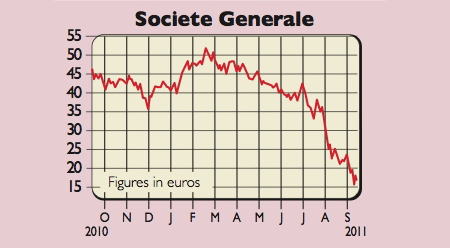Get the latest financial news, insights and expert analysis from our award-winning MoneyWeek team, to help you understand what really matters when it comes to your finances.
You are now subscribed
Your newsletter sign-up was successful
Want to add more newsletters?

Twice daily
MoneyWeek
Get the latest financial news, insights and expert analysis from our award-winning MoneyWeek team, to help you understand what really matters when it comes to your finances.

Four times a week
Look After My Bills
Sign up to our free money-saving newsletter, filled with the latest news and expert advice to help you find the best tips and deals for managing your bills. Start saving today!
The spotlight fell on French banks this week. On Wednesday, ratings agency Moody's cut the credit ratings of France's Crdit Agricole and Socit Gnrale and threatened to do the same to BNP Paribas, France's biggest bank. French banks' share prices fell earlier in the week, partly on fears of a downgrade. On Monday Socit Gnrale's stock plummeted by 11%.
Greece appeared ever more likely to default and Italy was forced to pay the highest interest rates on a five-year bond issue since it joined the euro. The sense of drift among policymakers was reinforced by German chancellor Angela Merkel. She said Europe was doing its utmost to avoid a Greek default a few days after one of her ministers openly broached the idea of an orderly default as a way out of the crisis.
What the commentators said
MoneyWeek
Subscribe to MoneyWeek today and get your first six magazine issues absolutely FREE

Sign up to Money Morning
Don't miss the latest investment and personal finances news, market analysis, plus money-saving tips with our free twice-daily newsletter
Don't miss the latest investment and personal finances news, market analysis, plus money-saving tips with our free twice-daily newsletter
The key problems with French banks is their exposure to Greece and how they raise funds, noted Jill Treanor in The Guardian. They hold $56.7bn of public and private Greek debt, more than other European banks. And "their wholesale funding mix is skewed to the short term", said Barclays Capital. This is bad news, given the squeeze in the short-term wholesale market. American money-market funds rattled by the debt crisis are retreating, said Nelson D Schwartz in The New York Times. In August, money-market funds and other short-term credit providers opted not to refinance $50bn of European banking debt.

The worsening banking situation is due to fears that a Greek default is looming. It will run out of money in a few weeks' time if it doesn't get its next tranche of EU/IMF aid soon; the payment has been delayed because it has made no progress on its austerity plans. The second Greek bail-out package is still far from being ratified by all eurozone member states. A Greek default could easily spread across the periphery. Policymakers, said Charlemagne on Economist.com, appear to be "out of ammunition and ideas". Indeed, "the sense of impending disaster", said David Blackburn on Spectator.co.uk, "is very real".
Get the latest financial news, insights and expert analysis from our award-winning MoneyWeek team, to help you understand what really matters when it comes to your finances.
MoneyWeek is written by a team of experienced and award-winning journalists, plus expert columnists. As well as daily digital news and features, MoneyWeek also publishes a weekly magazine, covering investing and personal finance. From share tips, pensions, gold to practical investment tips - we provide a round-up to help you make money and keep it.
-
 Pension Credit: should the mixed-age couples rule be scrapped?
Pension Credit: should the mixed-age couples rule be scrapped?The mixed-age couples rule was introduced in May 2019 to reserve pension credit for older households but a charity warns it is unfair
-
 Average income tax by area: The parts of the UK paying the most tax mapped
Average income tax by area: The parts of the UK paying the most tax mappedThe UK’s total income tax bill was £240.7 billion 2022/23, but the tax burden is not spread equally around the country. We look at the towns and boroughs that have the highest average income tax bill.

